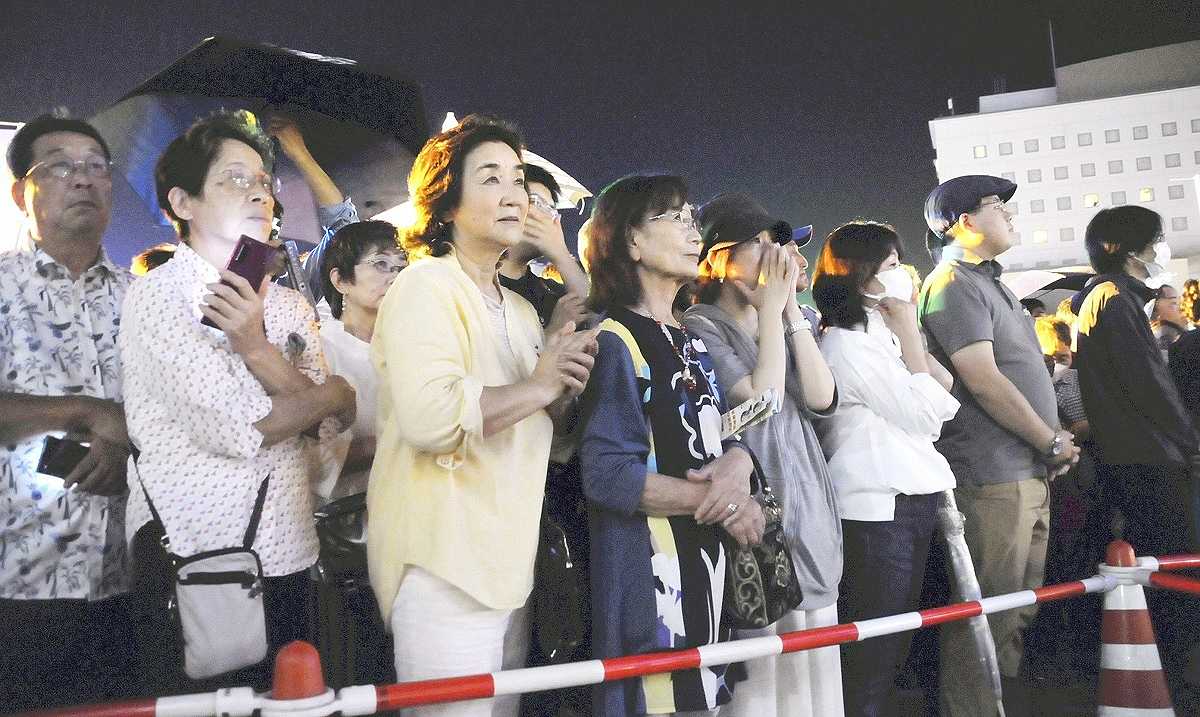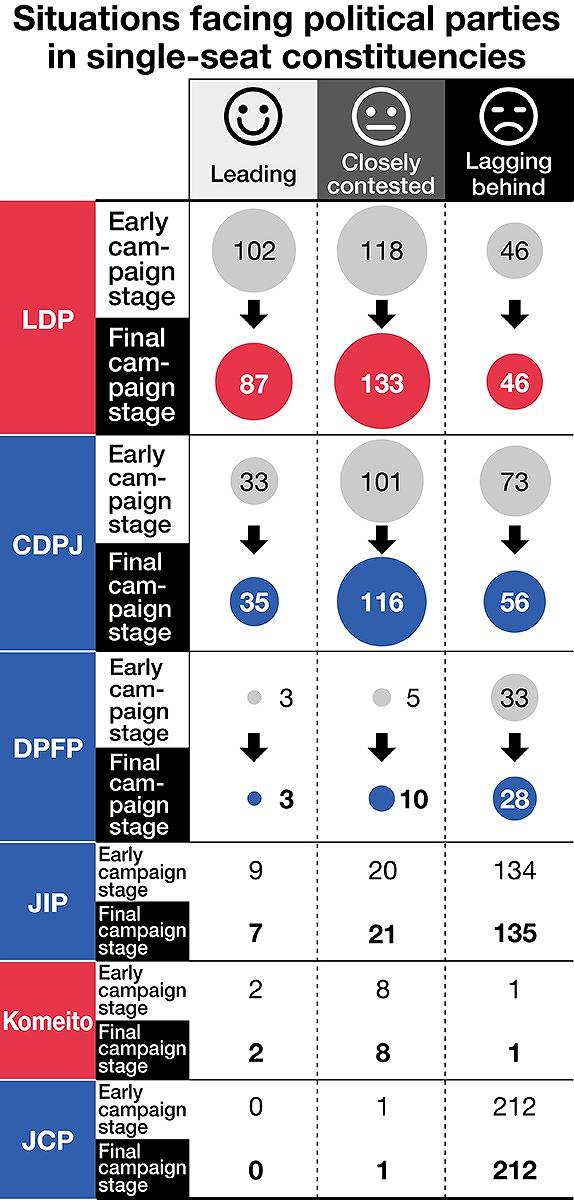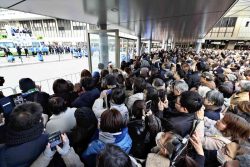Japan’s Ruling Parties Hard-Pressed to Keep Majority; Opposition CDPJ Likely to Make Gains, Poll Shows

People listening to a candidate for the House of Representatives election give a speech on the street in Hitachi, Ibaraki Prefecture on Saturday.
15:24 JST, October 25, 2024
The ruling parties are closely contesting with the opposition parties to secure a majority of the 465 seats in the House of Representatives, according to The Yomiuri Shimbun’s latest nationwide survey.
The Yomiuri Shimbun conducted the survey from Tuesday to Thursday to examine the final stage of the campaign for Sunday’s lower house election.
Candidates of the ruling Liberal Democratic Party face an uphill battle due to the recent political funds scandal. In contrast, the main opposition Constitutional Democratic Party of Japan is likely to significantly increase its number of seats in the house, and the Democratic Party for the People is also expected to make a leap forward. The Japan Innovation Party, meanwhile, is losing momentum in the race.
The analysis of the final campaign stage also took into account information gathered by Yomiuri Shimbun regional bureaus and offices across the country, in addition to the survey results.

The analysis of situations in 289 single-seat constituencies nationwide highlighted the fact that LDP candidates are closely followed by rival candidates in many constituencies. Among 266 LDP candidates, the number of those holding a lead declined to 87 from 102 in a previous survey of the same kind conducted in the early stage of the campaign. The number of LDP candidates in close battles increased from 118 to 133.
Also, the LDP might lose seats in proportional representation segments. While the party won 72 proportional representation seats in the previous lower house election in 2021, the latest survey found that the number may fall below 60. It is unclear whether the LDP will be able to maintain the 247 seats it held before the campaign started or even secure a majority by itself.
More than half of the 44 LDP members involved in the political funds scandal are lagging behind other candidates in single-seat constituencies.
Of 11 single-seat constituency candidates of Komeito, the LDP’s ruling coalition partner, two have the upper hand in their constituencies, unchanged from the previous survey, while many of them are in hotly contested races, including Komeito leader Keiichi Ishii, who is running in Saitama Constituency No. 14. It is also unclear if Komeito will be able to win as many proportional representation seats as it won in the 2021 election.
The CDPJ has been picking up momentum since the early stage of the campaign. While 73 CDPJ candidates faced an uphill battle in the previous survey, the number of such candidates fell to 56 in the latest survey while the number of CDPJ candidates in close competition increased from 101 to 116 over the same period.
Some CDPJ candidates running in close races have gained the upper hand, with 35 now leading their counterparts, mainly in the Tohoku region and the Tokyo metropolitan area, up from 33 in the previous survey. The party is expected to win 45 to 49 seats in proportional representation segments and increase the number of their seats in the lower house from the pre-election level of 98.
Three DPFP candidates are in leading positions while five of 33 candidates who were lagging behind in the early campaign stage are now closely contesting with their rival candidates. Given that the survey showed the party might double its number of proportional representation seats in the election, the party will likely win more seats in the segments than its pre-election level of seven.
Only seven JIP candidates hold prominent positions in single-seat constituencies in the Kansai region, down from nine in the previous survey. The party is also likely to take fewer proportional representation seats than the 25 it held before the election. It is unclear whether the party will be able to keep the 44 lower house seats it held before the election.
The Japanese Communist Party has momentum to win more seats in proportional representation segments than it did in the 2021 election. Reiwa Shinsengumi, the Social Democratic Party, Sanseito and the political group known as the Conservative Party of Japan are all expected to secure at least one seat.
The survey was conducted by phone and online and received answers from a total of 247,576 people. A certain number of respondents did not say who or which party they would vote for, making the situation unclear. A total of 1,344 candidates are running in the election, with 1,113 running in 289 single-seat constituencies and 231 running only in proportional representation segments.
Top Articles in Politics
-

Japan PM Takaichi’s Cabinet Resigns en Masse
-

Sanae Takaichi Elected Prime Minister of Japan; Keeps All Cabinet Appointees from Previous Term
-

Japan’s Govt to Submit Road Map for Growth Strategy in March, PM Takaichi to Announce in Upcoming Policy Speech
-

LDP Wins Historic Landslide Victory
-

LDP Wins Landslide Victory, Secures Single-party Majority; Ruling Coalition with JIP Poised to Secure Over 300 seats (UPDATE 1)
JN ACCESS RANKING
-

Japan PM Takaichi’s Cabinet Resigns en Masse
-

Japan Institute to Use Domestic Commercial Optical Lattice Clock to Set Japan Standard Time
-

Israeli Ambassador to Japan Speaks about Japan’s Role in the Reconstruction of Gaza
-

Man Infected with Measles Reportedly Dined at Restaurant in Tokyo Station
-

Videos Plagiarized, Reposted with False Subtitles Claiming ‘Ryukyu Belongs to China’; Anti-China False Information Also Posted in Japan






















